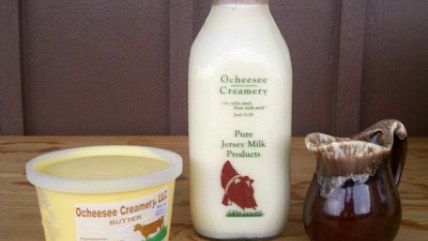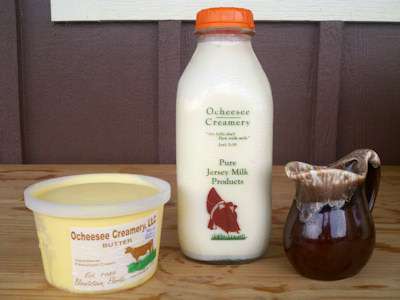Federal Judge Rules Skim Milk Isn't 'Skim Milk'
This is what happens when government regulators control definitions of words.


When is pure, all-natural, pasteurized skim milk not skim milk? When a federal court says so.
Ocheesee Creamery is a small creamery in Florida's Panhandle that's owned by Mary Lou Wesselhoeft and her husband, Paul. The creamery caters to "health-conscious milk drinkers—people who demand an all-natural product with nothing added—no preservatives, no nutrients that don't come straight from the cow."
Last week a federal judge ruled that because Ocheesee doesn't add vitamin A to its milk, Florida may prohibit the creamery from labeling its skim milk as "skim milk."
How did skim milk in Florida become something other than skim milk? This is an ongoing saga I describe at length in my forthcoming book, Biting the Hands that Feed Us (which is now available for pre-order on Amazon).
Ocheesee's problems began in fall 2012, when a Florida state agriculture department inspector suddenly ordered Ocheesee to stop selling its skim milk. The inspector hadn't found any food safety problems at the creamery. Instead, he determined that the issue with Ocheesee's additive-free skim milk was not what it contained but what it didn't contain—mandatory additives. Ocheesee's skim milk was just too natural.
It turns out that Florida's standard of identity for skim milk, which governs milk obtained and sold entirely within the state (and which apes FDA rules), requires that creameries and dairies add vitamin A to their skim milk. The inspector wrote on his stop-sale order, which effectively rendered Ocheesee's skim milk as contraband, the sole reason for his determination: "FAILURE TO ADD VITAMIN A."
Ocheesee offered to label its skim milk as "Pasteurized Skim Milk, No Vitamin A Added." The state balked, telling the creamery it must add vitamin A in order to call its skim milk "skim milk." Or, the state said, Ocheesee could sell its skim milk without adding vitamin A. But it would have to label the skim milk as "Non-Grade 'A' Milk Product, Natural Milk Vitamins Removed." There could be no mention of "skim milk" on the label.
That was unacceptable to Ocheesee—which was selling the very definition of skim milk, not some eight-word imitation "milk product." Rather than give in, Ocheesee retained the Institute for Justice and sued the state, in an effort to protect its First Amendment rights to label its skim milk honestly and accurately.
"Businesses have the right to tell the truth, and the government does not have the power to change the dictionary," IJ's Justin Pearson, Ocheesee's lead attorney in the case, told me last year.
I've been honored to serve as an expert witness in support of Ocheesee and its customers. As an expert, I spent several hours testifying in a deposition administered by the State of Florida's lawyers. I also drafted an expert report describing how Florida's mandated standard of identity for skim milk does not serve the interests of consumers in the state and tends to mislead consumers.
My role as an expert in the case was chiefly, as I describe in my expert report, "to discuss whether or not, in my opinion, consumers would tend to be misled by the labels at issue in this case." In my report, I conclude that Ocheesee's skim milk, which contains only skim milk, is skim milk. I also conclude that labeling skim milk that contains only skim milk as "skim milk" does not mislead consumers.
Notably, I also point out that Florida's suggested alternative label suffers a variety of fatal defects. For one, it paints entirely natural skim milk as a milk product that no reasonable consumer would believe consisted solely of one ingredient: skim milk. The state's standard is misleading, too, in that it doesn't even allude to the very reason people buy skim milk—the fact it contains no fat. It's also deceptive because it infers that all of the milk's natural vitamins have been removed, when in fact most natural milk vitamins remain in the skim milk, with vitamin A occurring in lesser amounts than it does in whole milk. (This is the case because vitamin A binds naturally to fat, and removing cream from milk also necessarily removes that vitamin with the fat.)
Is the addition of vitamin A to milk essential? While it's an important nutrient, most evidence shows Americans already get enough vitamin A in their diets. If there's anything we know about consuming vitamin A, it's that there's a very real danger—particularly to children—from consuming too much of it. In fact, Florida's own expert in this case cautioned state residents in 2013 against ingesting "too much vitamin A, because your body can store it and cause damage to the liver."
At trial, lawyers for Florida's agriculture department argued that Ocheesee's all-natural skim milk should be labeled as "imitation skim milk." In other words, the state of Florida considers pure, unadulterated skim milk to be "imitation skim milk." Sadly, a federal court appears to agree. In his ruling last week, U.S. District Court Judge Robert L. Hinkle refused to call Ocheesee's skim milk by its actual name, instead referring to the creamery's skim milk as "vitamin-deficient nonfat milk."
Ultimately, this case is about whether the government can use Orwellian logic to redefine the meaning of a traditional food like skim milk—whether they can mandate that "up" means "down." It's about whether government can force food makers to adopt a deceptive standard of identity and compel those same food makers to repeat that state-mandated deception time and again on their food labels.
"Mary Lou refuses to mislead her customers, so she will continue to dump this perfectly safe, legal, pure skim milk until the courts vindicate her right to tell the truth," IJ's Pearson told me this week. "We look forward to continuing this fight at the Court of Appeals."


Show Comments (117)